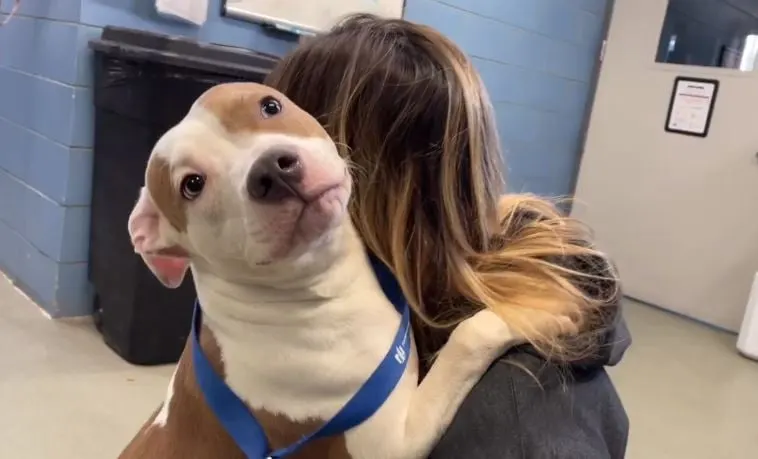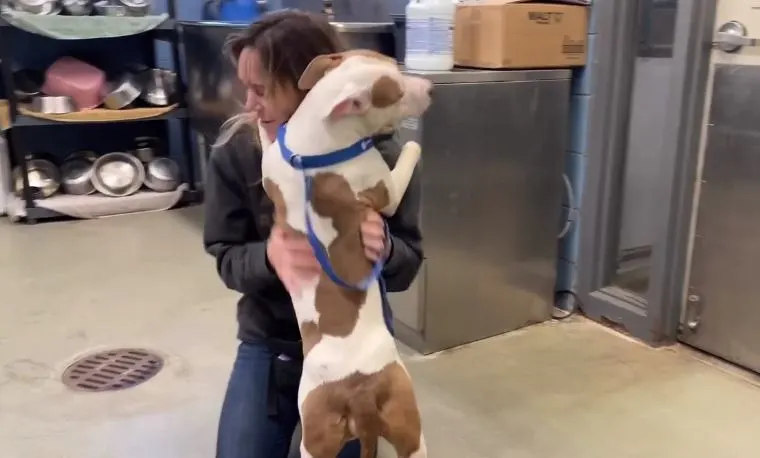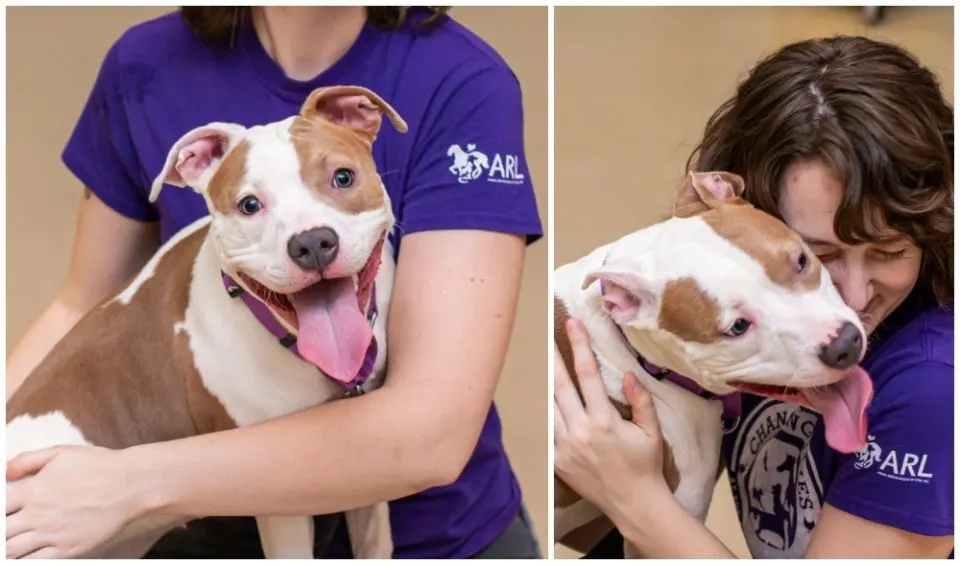During my career, I came across hundreds of dog abandonment stories with various excuses from irresponsible owners, but none of them ever sounded good enough.
What I’m trying to say is that there can never be a good reason for abandoning a dog on the streets without food, water, and a place to stay, especially when there are so many shelters and rescue centres that take great care of pups.
Leaving a dog because of the inability to board him on a flight cannot be justified either, which is why a man from Iowa is now facing misdemeanour charges.
The Doggo Terminal

Although this isn’t just a movie and there are no Tom Hanks or Catherine Zeta Jones included, Stella, a female pooch left in front of the airport for days, does share certain similarities with the protagonist of the “The Terminal” movie.
First of all, they both end up stuck at the airport (or in front of it), unwanted by people around them or those at home, and they both somehow manage to have a happy ending although they don’t end up with the ones they loved the most at that point.
I know it might sound funny at first, but if you really think about it, Stella really shares a similar fate as Viktor; however, she doesn’t come back to her old home, but gets a new one instead.
According to an Instagram post from the Animal Rescue League of Iowa (ARLIowa), Stella was a “Jane Doe dog” that was lucky to be found outside the airport. Further inspection revealed the whole mystery of a pup tied nearby the airport and the main culprit for such terrible act:
“[…] airline workers told us the dog was unable to board the cross-country flight home with her owner because the owner did not have a kennel. They said the owner left the airport with the dog, but returned alone, and went on to board their flight.”

Considering that the rescue staff had no idea what the doggo was called when they first found her, they decided to name her Allie.
Justice Always Gets Served
The owner of the pooch probably thought that he had fixed everything when he boarded the flight to New Jersey and left his family pet tied up outside the airport, but according to the words of ARL Iowa director, Tom Colvin, for Today, nothing was fixed at all.
Colvin told the whole story of a man who was trying to get on a flight from Iowa to New Jersey with a canine without a kennel (thinking that the airport provided clients with crates for their pets).
After finding out that he couldn’t move on with his dog, the man named Charles Bigsen (as stated in the media, including Daily Mail) allegedly tried to find a Good Samaritan who would take care of his pooch at the airport so he could board the flight.
However, there was no one willing to take over such responsibility, so Stella’s owner claimed he had no other option left but to tie the dog outside and leave.
Now, Bigsen is facing several charges, including animal neglect and abandonment, which will be applied as soon as he comes back to Iowa.
New Day, New Home
Stella/Allie went through a lot, especially after having to spend days without proper food, water, or freedom to move, but after the ARL came to the rescue, her life immediately changed for the better.

After a warm bath, vet checkup, and lots of cuddles, Allie was up for adoption. Although the staff first thought it wouldn’t be easy to find her the perfect owner, that didn’t turn out to be a huge issue.
Her charming personality, goofy behaviour, and great looks helped her find the right home in less than a month.
Even though both Allie and the ARL staff had a great time together, the main point of her stay at the rescue was to find people who would love her, appreciate her, and never abandon her at the airport or any other place in the world.
As ARL Iowa stated in their update post:
“We’re happy to tell you that Allie, the dog left at the Des Moines airport, was adopted yesterday (January 12, 2023) by a family who saw her at the airport the day she was abandoned. Her new family has already reached out to us with an update, saying Allie is settling in very well.”
Although I’m beyond happy for Allie, it makes me sad to see how many pooches are still waiting for their forever home.
Still, I’m sure there are plenty of great people like the ones who adopted Allie who can’t wait to save another doggo’s life and change it for the better.
If you’ve ever wandered through a bustling city or attended a summer cookout, chances are you’ve come across the beloved snack known as hot dogs. But have you ever wondered why these iconic sausages are sometimes referred to as “glizzys”? The term may sound quirky, but there’s a fascinating story behind this nickname that adds a dash of mystery to everyone’s favorite handheld treat.
The Origin of “Glizzy”
Unpacking the Slang Term
So, why are hot dogs called “glizzys”? The term “glizzy” is believed to have originated in the Washington, D.C. area and has become a popular way to refer to hot dogs in certain communities. It’s thought to have its roots in local slang and has spread to wider usage, particularly in the younger generations. The exact origin may vary depending on who you ask, but one thing’s for sure – it’s a catchy and unique way to talk about everyone’s favorite handheld snack.
Hot Dog History and the Birth of “Glizzy”
Hot dogs have a rich history dating back to the late 19th century when German immigrants brought their sausage-making traditions to the United States. Over time, hot dogs have become a staple of American cuisine, found everywhere from sporting events to backyard barbecues. The term “glizzy” adds a modern twist to this classic food item, showcasing how language evolves and changes over time. Whether you call it a hot dog or a glizzy, one thing is certain – it’s a tasty treat enjoyed by many across the country.
Cultural Impact of the Nickname
Memes and Social Media Influence
Cultural Impact of the Nickname
If you’ve scrolled through social media recently, you might have come across memes and posts referring to hot dogs as “glizzys.” This playful nickname has gained popularity in online circles, especially among younger users. From witty jokes to funny references, the term “glizzy” has become a part of internet culture, showcasing how language evolves and adapts in the digital age.
“Glizzy” in Music and Entertainment
In the realm of music and entertainment, the nickname “glizzy” has made its mark. Artists and influencers often incorporate slang terms like “glizzy” into their lyrics or content, further solidifying its presence in popular culture. Whether it’s a shoutout in a song or a reference in a video, the use of “glizzy” adds a touch of contemporary flair to the creative landscape, demonstrating how language continues to transform and resonate across different art forms.
The Transition from Street Talk to Mainstream
How Slang Terms Gain Popularity
Slang terms like “glizzy” often start within specific communities, like urban areas or online circles. They gain traction through repeated use by influencers, celebrities, or simply through the power of social media. As these terms become more widespread, they transition from being niche to mainstream, shaping the way people communicate and express themselves.
The Role of Urban Communities in Language Evolution
Urban communities play a significant role in the evolution of language, including slang terms like “glizzy.” These communities, with their unique cultures and vibrant language dynamics, act as breeding grounds for new words and expressions. As these terms gain acceptance and recognition within these communities, they eventually spread to broader audiences, leading to their incorporation into mainstream culture.
In this section, we’ll explore how slang terms such as “glizzy” make their way from niche communities to the broader mainstream, influencing language evolution along the journey.
Debunking Myths Around the “Glizzy” Name
Clearing Up Common Misconceptions
Let’s clarify some misconceptions about why hot dogs are called “glizzys.” One common myth is that the term originated from a specific region or community. However, the truth is that “glizzy” is often used as a playful slang term for hot dogs in various online spaces without a specific regional origin. It’s more about how the term has been adopted and shared across different platforms.
The Real Story Behind the Hot Dog Alias
You might be curious about how the name “glizzy” became associated with hot dogs. The reality is that slang terms like “glizzy” often emerge organically within communities and online forums. Influencers, celebrities, and social media play a significant role in popularizing these terms, leading to their widespread use. So, the next time you hear someone refer to a hot dog as a “glizzy,” you’ll know that it’s simply a fun and trendy way of talking about everyone’s favorite snack.
Conclusion
So, there you have it – the mystery behind why hot dogs are called glizzys has been unraveled. It’s fascinating to see how language evolves in the digital age, with slang terms like “glizzy” taking on a life of their own. Remember, language is fluid, and what may seem strange today could become mainstream tomorrow. Embrace the quirks and nuances of internet culture, and who knows, you might find yourself using terms like “glizzy” without a second thought. Stay curious, keep exploring the ever-changing landscape of online language, and don’t be afraid to dive into the world of internet slang. Enjoy your glizzys with a side of linguistic adventure!
Frequently Asked Questions
What is the cultural significance of the nickname “glizzy” discussed in the article?
The nickname “glizzy” holds cultural significance as a playful term primarily used online for hot dogs. It has become integrated into music, entertainment, and internet culture, resonating with younger users in particular.
Are there any myths debunked in the article regarding the origins of the term “glizzy”?
Yes, the article debunks myths related to the origin of the term “glizzy.” It clarifies common misconceptions and explains that “glizzy” is a slang term used across online spaces without a specific regional origin.
How do slang terms like “glizzy” emerge according to the article?
Slang terms like “glizzy” emerge organically within communities and online forums. Influencers, celebrities, and social media platforms play a significant role in popularizing these terms, leading to their widespread use.
[no_toc]

Hey there, I’m Janet Brooks, a dog-loving student from California. I’m all about helping pups in need, especially those without homes. Me and my awesome friends work together to give shelter and love to stray dogs. Oh, and I also write blogs about dogs to share helpful info.